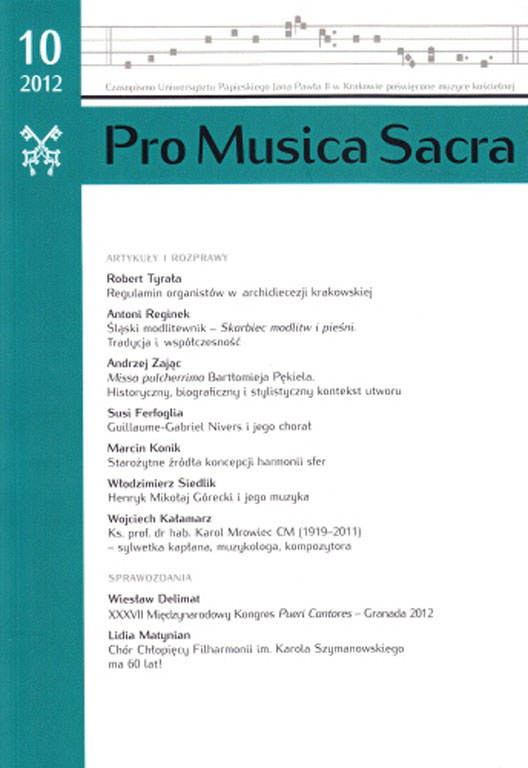Guillaume-Gabriel Nivers i jego chorał
DOI:
https://doi.org/10.15633/pms.339Słowa kluczowe:
Treatise on Gregorian Chant, organist, Parisian parish od Saint-Sulpice, Gregorian Chant, Council of Trent, liturgical Tradition of Church, liturgyAbstrakt
Guillaume-Gabriel Nivers (ca. 1632–1714), a composer and organist of the Parisian parish of Saint-Sulpice, regarded as one of the keenest advocators of the Gregorian chant in the 17th c. when heated debates on its subject were carried out by the Church. The Gregorianists of Grand Siècle carefully analysed the proper approaches towards this way of singing, how to interpret it, what is the correlation between words and chants, what should be the proper rhythm. Amongst various opinions (e.g. by Jumilhac and Le Clerc) representing purely theoretical approach, Nivers’ main idea was to make a choral regain its place as most appropriate during liturgy. For that reason his theoretical work Dysertacja na temat chorału gregoriańskiego (Treatise on Gregorian Chant) was wholly written in order to present “proper” rules of the chant, cleansing it of all misinterpretations and misuses to have crept into it over the centuries. In his work Guillaume- Gabriel Nivers used his high abilities and paid due respect to tradition when relying on the authorities of the Church, e.g. St. Augustine, St. Gregory or St. Justin. In his approach towards the Gregorian chant he emphasised the principle of Church “correctness” which consisted in:
- excluding from singing all connections with secular music;
- focusing on internal sense of lyrics through „affects” included in particular modes, proper punctuation in texts, and making melodies apply to grammar rules;
- respecting inégalité (inequality) in singing, as resulted from „good taste” and rules of diction.
Pobrania
Opublikowane
Numer
Dział
Licencja
Prawa autorskie (c) 2012 Susi Ferfoglia

Utwór dostępny jest na licencji Creative Commons Uznanie autorstwa 4.0 Międzynarodowe.
Twórca oświadcza, że przysługują mu prawa autorskie do utworu i że nie są ograniczone w zakresie objętym niniejszym oświadczeniem oraz że utwór jest dziełem oryginalnym i nie narusza praw autorskich innych osób.
Twórca zezwala Uniwersytetowi Papieskiemu Jana Pawła II w Krakowie na nieodpłatne, niewyłączne i nieograniczone w czasie korzystanie z utworu, to jest:
- utrwalanie i zwielokrotnianie: wytwarzanie egzemplarzy utworu techniką drukarską, reprograficzną, zapisu magnetycznego oraz techniką cyfrową;
- obrót oryginałem albo egzemplarzami, na których utwór utrwalono (wprowadzanie do obrotu, użyczenie lub najem oryginału albo egzemplarzy, publiczne wystawienie, wyświetlenie, a także publiczne udostępnianie utworu w taki sposób, aby każdy mógł mieć do niego dostęp w miejscu i w czasie przez siebie wybranym);
- włączenie utworu w skład utworu zbiorowego;
- udzielanie przez Uniwersytet Papieski Jana Pawła II w Krakowie sublicencji Creative Commons Uznanie autorstwa 4.0 Międzynarodowe (CC BY 4.0)
Uniwersytet Papieski Jana Pawła II w Krakowie udostępnia utwór na Platformie Czasopism należącej do uczelni, na licencji Creative Commons Uznanie autorstwa 4.0 Międzynarodowe (CC BY 4.0) Tym samym uprawnia wszystkich zainteresowanych do korzystania z utworu pod następującymi warunkami:
- zostanie podany autor i tytuł utworu,
- zostanie podane miejsce publikacji (tytuł czasopisma i adres internetowy do oryginalnie opublikowanego utworu).

